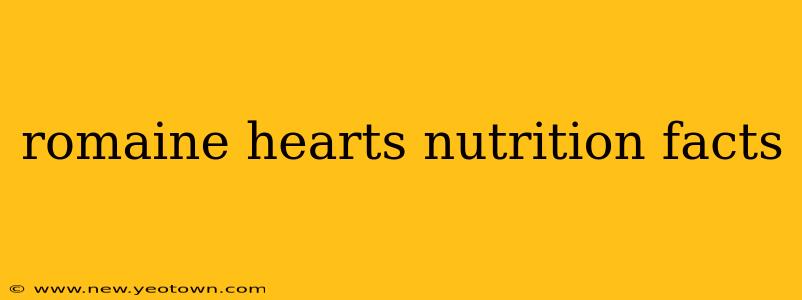Romaine lettuce, particularly its tightly-packed heart, has long been a staple in salads and healthy eating plans. But beyond its satisfying crunch, romaine hearts boast a surprisingly impressive nutritional profile. Let's delve into the world of romaine heart nutrition, exploring its benefits and answering some common questions.
Imagine biting into a crisp, cool romaine heart. That satisfying crunch isn't just about texture; it's a taste of vitamins, minerals, and antioxidants. This isn't your average leafy green; romaine hearts pack a nutritional punch, providing essential nutrients that support overall health and well-being. This article will explore the nutritional powerhouse that is the romaine heart, detailing its benefits and answering common questions surrounding its nutritional value.
What are the nutritional benefits of Romaine hearts?
Romaine hearts are low in calories and high in nutrients. They are an excellent source of vitamin K, vitamin A, vitamin C, and folate. They also contain a good amount of potassium, manganese, and fiber. These nutrients contribute to various health benefits, including improved bone health, enhanced immune function, and better digestive health. The high vitamin K content is particularly noteworthy, playing a crucial role in blood clotting and bone metabolism. Furthermore, the antioxidants present in romaine hearts help protect cells from damage caused by free radicals.
How many calories are in a romaine heart?
A typical romaine heart, approximately 50 grams, contains roughly 8-10 calories. This low-calorie density makes it an ideal addition to weight-management diets, allowing you to enjoy a substantial volume of food without significantly impacting your daily calorie intake. This makes it a perfect choice for those looking to add volume and nutrients to their meals without adding extra calories.
Is Romaine heart better than other types of lettuce?
While all lettuces offer some nutritional value, romaine hearts often stand out due to their higher concentration of certain nutrients, particularly vitamins A and K. Other lettuces, like iceberg lettuce, are generally lower in nutritional density. However, dietary variety is key, and incorporating a range of leafy greens into your diet is always recommended. The "best" lettuce truly depends on individual preferences and dietary needs.
What are the potential health benefits of eating romaine hearts?
The nutritional profile of romaine hearts translates to several potential health benefits. Its high vitamin K content supports bone health, while the antioxidants help protect against cell damage. The fiber content aids digestion, promoting regularity and gut health. The potassium contributes to maintaining healthy blood pressure. These benefits, combined with its low calorie count, make romaine hearts a valuable addition to a balanced diet.
How much romaine heart should I eat per day?
There's no single "magic number" for romaine heart consumption. A healthy diet incorporates a variety of fruits and vegetables, and romaine hearts should be considered part of that broader picture. Aim to include a serving of leafy greens, including romaine, in your daily meals. The exact amount will depend on individual caloric needs and dietary preferences.
Are there any risks or side effects associated with eating too much romaine heart?
While generally safe, consuming excessive amounts of any food can lead to potential issues. In the case of romaine hearts, consuming extremely large quantities might lead to mild digestive discomfort, such as bloating or gas, due to the fiber content. However, this is unlikely with moderate consumption as part of a balanced diet.
Are there any potential interactions between romaine hearts and medications?
There are no known significant interactions between romaine hearts and commonly used medications. However, as with any food, individuals on specific medications or with underlying health conditions should consult with their doctor or a registered dietitian to discuss any potential concerns.
In conclusion, the humble romaine heart deserves a place of honor in your kitchen and on your plate. It's a readily available, cost-effective, and exceptionally nutritious food that offers a wide array of health benefits. So next time you're building your salad, remember the power packed within each crisp, cool bite of a romaine heart.

